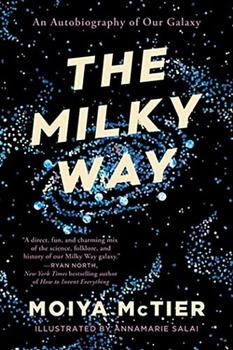Summary | Excerpt | Reviews | Beyond the Book | Readalikes | Genres & Themes | Author Bio

An Autobiography of Our Galaxy
by Moiya McTierForeword from Moiya
"I HAVE LOVED THE STARS too fondly to be fearful of the night."
This last line from Sarah Williams's poem "The Old Astronomer to His Pupil" has often been a sort of mantra for me. And not just because it makes me sound like a spooky Victorian recluse.
I don't remember how, but as a young kid, I got it into my head that the sun and moon were my celestial parents. I imagined that they watched over me, and I actually talked to them, told them about what I was learning in school and what my friends were like (because, as I was surprised to learn, those friends didn't talk to the moon and sun, so someone had to tell our celestial mom and dad what was up). When my earth parents started having arguments at night, I cried to my celestial mom. And when my birth dad stopped showing up for scheduled home exchanges, my little kid mind decided to blame the sun, too. To this day, I don't like LA because it's too sunny.
My earth mom fell in love again and we moved from our small Pittsburgh apartment to the strangest place I could imagine: a log cabin in the middle of the woods without running water, so close to the West Virginia border that I had to cross state lines to reach the nearest bookstore. The forest was the best playground an only child could ask for, a space to invent epic quests, hunt for faerie rings, or find the perfect branch to use as a fighting staff in mock battles with my new earth dad. But the community surrounding that forest, full of people who had only ever seen a Black person on TV, probably wasn't the hometown I would have picked for myself if my mom had asked.
For that reason and so many more (you try getting your period at ten years old when you don't have a working shower in your home), I sought comfort from the moon well into my adolescence. I developed a great love for the nighttime, the time of quiet, secrets, and peace. Declaring myself a creature of the night helped cement my desired place as the Weird Kid, as if being the smartest and also the blackest person at my small, rural school didn't already make me stand out enough. That's not an empty flex; I was voted most unique and was easily the valedictorian of my class after skipping sophomore year. People still said I only got into college because of affirmative action.
Don't get me wrong, most people I interacted with were very kind, and I'm grateful for the experiences had and connections made that let me empathize with a part of the country that rightfully feels ignored by the very class of intellectual elites I worked my ass off to break into. I learned valuable lessons in coal country, like how to chop firewood, do a deep-conditioning treatment with nothing but a bucket of water and a cup, and look past obvious differences to find common ground. But I also learned early on that my life would be better if I got myself out of there ASAP. Lucky for me, Harvard admissions officers are much fonder of bizarre, brilliant, Black girls than a lot of miners' sons were.
Even though I always felt most comfortable at night and lived in a place with a beautiful view of the stars, I was never interested in the academic study of space before college. I merely loved the celestial aesthetic. But it didn't take me long to fall in love with the logical, data-driven nature of astronomy. The summer after sophomore year, I did a research internship where I spent hours analyzing five-dimensional data cubes to measure properties of a distant star-forming galaxy that I nicknamed Rosie. Falling deeper into astrophysics felt like learning how to talk to space in a whole new way, one that let me listen a little bit more to what the universe was saying instead of making up responses in my head. I was learning the language of gravity, cosmic rays, and nuclear fusion. With my new dictionary in hand, I set out to research as many different aspects of space as possible: star formation, the cosmic microwave background, X-rays from distant quasars, exoplanet characterization, stellar dynamics, and the chemical evolution of galaxies.
Excerpted from The Milky Way by Moiya McTier. Copyright © 2022 by Moiya McTier. Excerpted by permission of Grand Central Publishing. All rights reserved. No part of this excerpt may be reproduced or reprinted without permission in writing from the publisher.
Your guide toexceptional books
BookBrowse seeks out and recommends the best in contemporary fiction and nonfiction—books that not only engage and entertain but also deepen our understanding of ourselves and the world around us.